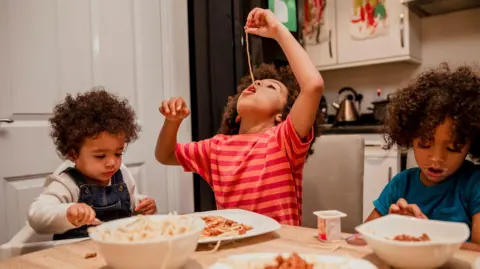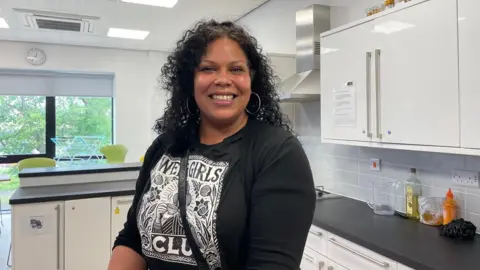Cost of living correspondent
 Getty Images
Getty ImagesThe school summer holidays means many parents face the task of cooking up lunches and snacks for children eating most of their meals at home for six weeks.
It can prove costly especially as food prices are rising faster now than at any point in the last year. School dinners are often subsidised so doing it yourself can get pricey.
Some parents have shared how meticulous planning and creative cooking has been helping them keep their shopping bill down.
Fill your freezer with yellow-sticker food

For mum-of-two Evelyn buying reduced items is key. “I’m not afraid of a yellow sticker, especially for my meat, that’s what your freezer is for,” she says.
At home in Gorton, in East Manchester, she’s been preparing for the summer holidays for months, buying reduced items to pop in the freezer and use when there are more mouths in the house to feed.
She has a 12-year-old daughter who gets free school meals during term time and a 19-year-old son who’s back home from university for the holidays.
“The snacking is immense,” she says.
But she’s determined not to waste anything. “When you’ve got things going off, try and make something else out of them. Dip fruit into yoghurts, bang them in the freezer and you’ve got nice little frozen berry yoghurt snacks.”
Evelyn receives a £50 voucher to help with the cost of summer holiday food from Manchester City Council issued by her daughter’s school. She says they are a “big help”, particularly as they are not tied to one supermarket, so she can shop around for the best deals.
Food prices increased by 4.5% compared to June last year, and it’s expected the next set of official figures will show a further rise in July and August.
Benefit payments went up in April and after taking inflation into account, average wages grew by 1.5% between April and June.
But rent and mortgages rises, as well as increases in the cost of summer holiday clubs or childcare means many families say they aren’t feeling any better off.
Put food for each day in a separate bag

Laura is out of work at the moment and has three children who she describes as “eating machines” who receive free school meals during term time.
But in the school holidays “sometimes we’ve got plenty of food, and sometimes we don’t, so you have to get creative,” she says.
Her tactic is to see what food she has, and put it into separate bags for each day, to help make sure the food lasts all week.
She says putting food in high kitchen cupboards – out of reach of the children – means the snacks don’t all disappear in one go.
“It can be really really hard when you’re having to scrimp and save and spend so much time thinking and organising and figuring out where the food is going to come from,” she says.
Laura says her local pantry the Bread And Butter Thing in South Manchester has been “a lifeline”.
She pays £8.50 for three bags of surplus food from supermarkets, farms and wholesalers. What’s inside is pot-luck but there is always fresh fruit and veg.
“It means I can put something on the table that they are going to want to eat and that’s financially viable,” she said.
The UK’s biggest food distribution network Fareshare says it has already supplied ingredients for 400,000 more meals this school holiday compared to last summer.
Child Poverty Action Group is among charities warning the current funding is not enough to help all the households that are struggling.
Order your fridge by use by date

Colette is mum to seven-year old Mary and 14-year-old Henry as has previously spoken to us about high prices in supermarkets.
She lives in south Manchester and juggles three part-time jobs as a music teacher and carer. She gets paid for her school-based work at the start of each term and says making the money last over the summer holidays is always difficult.
“We have to be clever and careful about how we use the food,” she says. “Which is no different to normal it’s just there’s more meals to make out of what we’ve got”.
There’s one basic rule she sticks by: “We don’t waste anything,” she says. “Even crusts.”
“It sounds really silly but it’s having a system in the fridge of making sure the stuff that’s at the front is the stuff that needs using first,” she says.
“The kids are not going to rummage around and look at use by dates, but if it’s at the front I know that’s the one that needs using first.”
The family try and batch cook too. Henry joined in to make a bolognaise this week, and now there’s an extra portion in the freezer for another day.

How to get help with school summer holiday food
- In England and Wales low-income families should have access to free food at holiday schemes through the Holiday Activities and Food Programme.
- Some councils also give food vouchers directly over the holidays through a government pot called the Household Support Fund.
- In Scotland some councils are also offering extra free school meal payments to low-income families over the school holidays. However, in Northern Ireland there is currently no funding in place, as “holiday hunger” payments were stopped in 2023 as a cost cutting measure.
- Food banks provide emergency help for those in dire straights, but an increasing number of Food Pantries, or Food Clubs now exist across the UK. Here members pay a small fee, and are given a fixed number of bags of food each week.
- Some apps like Olio and TooGoodToGo allow you to get cheap or free food from cafes and shops that would otherwise go to waste at the end of the day.




